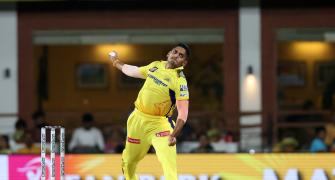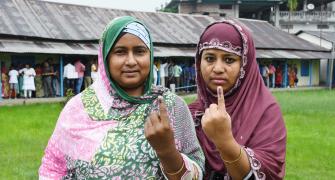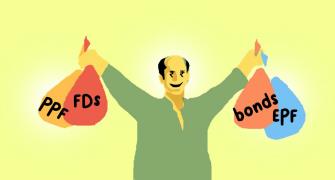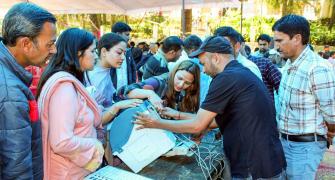Prof Madaboosi Santanam Ananth is one of the most vocal academicians in the country. He has been the director of IIT-Madras since 2001.
Prof Ananth joined as faculty in the department of chemical engineering at IIT-Madras in 1972. Rediff.com guest columnist Yogesh K Upadhyaya speaks with Prof Ananth to get his views on wide-ranging academic issues and also on the Pan-IIT 2008 meet, which is going to be held at the IIT-Madras between December 19 and December 21.
Excerpts:
How is tomorrow's Pan-IIT 2008 meet being planned?
The alumni from all the IITs will host the PAN-IIT meet at IITM between December 19 and December 21. The event will showcase the growth of our institute in particular and IIT in general.
We plan to make the most of this occasion to improve the institute's infrastructure without compromising on its pristine surroundings.
However, on July 31, 2008, IITM kicked off its Golden Jubilee celebrations. The day's event was attended by minister of state for human resource development D Purandeswari. Tamil Nadu Chief Minister Kalaignar M Karunanidhi was present on the occasion. The German Ambassador to India Bernd Mutzelburg, and secretary, ministry of human resource development, R P Agrawal, too, were present.
IIT-Madras is proud of its association with Germany and grateful to its assistance. To commemorate the collaboration, IITM and German Academic Exchange Service had organised a programme on September 8, 2008.
Federal minister of education and research, government of Germany, Annette Schavan, and federal minister of science and technology and ocean development, government of India, Kapil Sibal, were the chief guests for the event.
Secretary, department of science and technology, Dr T Ramasami and Charge d' Affaires, German Embassy, Christian -- Matthias Schlaga, too were present.
R Seshasayee and V K Viswanathan, managing directors of Ashok Leyland and Bosch respectively, who had supported the new engineering design programme to the tune of Rs 8 crore (Rs 80 million) inaugurated the new building for the department.
The National Centre for Catalysis Research, a Rs 16-crore (Rs 160-million) unit, supported by DST, was also inaugurated.
The Journal of Engineering Science and Applied Mathematics was launched at the event by Sibal and handed over to Schavan.
The September 8 event was followed by an Indo-German workshop on sustainable development.
A Centre for Innovation, exclusively meant for students and planned by students to convert 'ideas into products', funded by the IIT alumni -- class of 1981 -- was inaugurated on October 31.
The institute has lined up a number of events for the next few months. These include international conferences, commencement of post-graduate programmes in clinical engineering in collaboration with two sister institutions -- Chitra Tirunal Institute for Medical Sciences and Technology, Thiruvananthapuram and Christian Medical College, Vellore.
The institute's Golden Jubilee year will also see commencement of PG programmes in medical instrumentation, catalysis, nuclear technology and petroleum technology.
The institute's science departments will offer integrated PG programmes and courses to meet the changing aspirations of students.
About 35 books in science, technology, humanities and management will be published by the faculty members soon.
Departments like telecommunication, nano technology, bioprocess technology and sustainable development will have new centres.
Eminent personalities will deliver Golden Jubilee lectures throughout the year. The institute will soon have an indoor sports complex, which is under construction at the moment.
Last but not least, the year-long celebrations will include a number of cultural events -- one of which -- 'Nostalgia' -- plans a reunion at the campus of the retired professors and staff -- both from India and Germany.
The Golden Jubilee celebrations would continue till July 31, 2009 and would come to an end with the 46th IIT convocation.
Columbia University economist Jagdish N Bhagwati would grace the convocation as the chief guest. He would be conferred Doctor of Science Honoris Causa by the senate of IIT-Madras at the event.
There is a lot of discussion on the need to carry out reforms for IIT-JEE exam. Please explain your position.
The IIT-JEE (joint entrance examination) is arguably the most competitive examination in the world.
In JEE-2008, about 311,000 students competed for 6,872 seats. The IIT brand now has international recognition, while many of our state universities which were well known 30 years ago have declined for various reasons.
Therefore, getting into IIT has become one of the biggest ambitions of students today.
A huge coaching industry has developed as a result to aid students meet this objective. IIT coaches have successfully evolved methods of 'pattern recognition' which help students 'crack' the JEE papers.
The JEE has remarkable rejuvenation property and the paper setters are quite innovative in their jobs.
Our experience tells us that about 15 per cent of the students seem to succeed in the entrance examination despite lacking in interest for engineering or communication skills.
Second the coaching industry often takes students away from schools and retains them for as many as three years.
Students, who get into IITs after coaching, often have a distorted value system: they think the end justifies the means (they themselves were given attendance in their schools although they were absent most of the time).
For a few decades, performance in the JEE was the sole criterion for admission into the IIT system.
Beginning 2006, the criteria of minimum marks in the board examination was introduced. IITs suggested that it should be as high as 85 per cent but upon the recommendation of the boards, it was reduced to 60 .
Third, a significant fraction of the students wrote the JEE papers four to five times before 'succeeding'. This unhealthy practice has been eliminated since 2006 and subsequently students have been allowed to write the JEE only twice.
It is, perhaps, necessary to use the board examinations as a criterion for pre-selecting students who can sit for the JEE.
One method is to select top students from different boards so that a maximum of 10 students per seat appear in the JEE. However, the IITs have set up a committee to look into these issues and come up with a recommendation for JEE reform.
How can IITs solve the problem of faculty shortage? How does the government plan to introduce reservation quota for faculty? Will it affect teaching at the IITs?
The shortage of faculty cannot be solved in the short term. While there is a shortage of quality faculty, all the IITs have succeeded in recruiting considerable number of faculty over the last six years.
IIT-Madras has, for example, recruited over 200 faculty of whom at least a third did their bachelor's in one of the IITs and had gone abroad to do PhDs.
The shortage of faculty arises from the fact that the number of PhDs in engineering in India is far below than that required. Until it changes, we have to depend on PhDs from abroad.
It is estimated that there is a pool of 60,000 PhDs from India in the US. The pay scale of faculty, while not unreasonable per se, has been very low compared to industrial pay scales.
It is, therefore, essential that the senior faculty elaborately speaks about the job attractions (excitement, constant interactions with young people and academic freedom) of the faculty positions.
The new pay scales are likely to help to some extent. Meanwhile, all IITs are on the way to increasing their PhD output.
The issue of reservation for students is justified on the basis of the need for equality. However, this logic does not extend to faculty recruitment.
In view of reserved seats of students, it is necessary that they be taught by the best faculty. Therefore, reservation in faculty recruitment will not help students.
Second, since IITs recruit only PhDs as faculty, a very exclusive group in India, it is indeed a contradiction to reserve jobs for them.
However, it should be noted that all factors being equal, preference is already given to scheduled castes/scheduled tribes in the selection of faculty.
What steps do you recommend to improve the state of engineering education in India?
Following is the set of recommendations that the Working Group of the National Knowledge Commission on Engineering Education has come up with after a series of serious deliberation:
Increasing faculty numbers and quality
- Access and Inclusiveness: Government should set up new engineering institutions in the under provided regions and provide help to poor students.
- Increasing the number of faculty: The number of faculty should be increased by: Increasing the PhD manpower, allowing faculty with Master's degree for undergraduate teaching, inviting adjunct/additionalfaculty from industry and research laboratories, tapping potential faculty at early stage at undergraduate level, and providing other incentives such as allowing vacation time for teachers for industrial training to improve practical skills, etc.
- Ensuring Quality of faculty: This can be done by: providing continuing education in distance mode, short-term training programs, arranging one-day regional workshop on teaching/learning processes, two-week teacher induction training, etc.
The teaching learning processes
- A credit based, semester system should be introduced in all engineering/science colleges/institutions with a common core of engineering/science in the first two years and a flexible professional stream in the last two years.
- The current curriculum should be modified to provide flexibility, interdisciplinary method and choice of electives. At least one of the humanities courses should concentrate on developing oral and written communication skills.
- Teacher-student and student-student relationships -- teacher-student relationships outside the classrooms should be encouraged by providing different structured avenues in which both participate informally.
Industry Institute Interaction
- In order to meet the increasing demand, more institutes of excellence need to be established. Public-private partnership could be explored for the same purpose. However, all polytechnics should be operated in PPP mode.
- Academia and industry should engage in joint research in order to improve innovation and competitiveness in the global economy of today.
- The industries may select final year engineering students from different engineering colleges and can offer 'Industry Specific Training' during the vacation to supplement the curricular learning in the colleges. The current Apprenticeship Act should be amended to include option of training in multiple skills with provision of multiple entry and exit.
Regulation
- An apex independent regulatory authority should be established that can achieve the objectives of regulation without political interference. An autonomous Standing Committee for Engineering Education should be established under proposed Independent Regulatory Authority of Higher Education.
- Establish a system of 'Chartered Educationist Certificate' under which Chartered Educationist will perform the role of auditing and institutions will be mandated to undertake the entire auditing process.
- Accreditation of Institutions -- The Standing Committee on Engineering Education shall determine the criteria and the processes of accreditation in consultation with experts from academia and industry.
- Ranking of Institutions -- It is essential to introduce ranking of institutions based on overall performance as well as sector specific performance based not only on technical but also on inclusivity, gender equality, international practice, non academic parameters like in the US.
Governance
- Autonomy to institutions The system of affiliation should be done away with.
- Transparency - It should be made compulsory for all colleges to give all information about their buildings, labs, faculty, intake of students, output performance of students, placements, Chartered Educationist Report, etc. on the website.
- Institutes should consider having two cells -- Counselling Cell and Training and Placement Cell. The former is more of general nature where students especially the ones in first year get help to adjust in a new environment. The latter is to help graduating students to prepare themselves for the placement as well to handle the stress of a failure.
Integrating Sciences and Engineering Education
- In order to reduce the perceived gap between science and engineering, it is desirable to start four year undergraduate programmes in science along the lines of engineering programmes.
Please tell us more about IIT-Hyderabad, which is being set up in collaboration with IIT-Madras.
IIT-Madras (IITM) is the mentor institute for IIT Hyderabad (IITH). There are several ways in which the IITH programme is being mentored.
First a task force of 12 faculty members (eleven from IITM and one from IIT-Kanpur) has been set up under the chairmanship of Prof CVR Murty, visiting professor, department of civil engineering, and Prof David Koilpillai, department of electrical engineering, both from IITM.
The entire teaching of the first semester course is being handled by 10 faculty members and guest lecturers from IITM. An academic council has been set up to serve in lieu of the senate of IITH to handle all the academic aspects of IITH.
A building and works committee and a finance committee are being constituted to help in the development of the new campus.
In order to establish a strong research character at IITH, PhD students will be admitted beginning in the January 2009 semester.
The plan is as follows:
Currently IITH is being run from the premises of the Ordnance Factory in which approximately Rs 5.5 crore (Rs 55 million) has been spent to set up the infrastructure.
The land for the permanent campus (523 acres) has been received from the government of Andhra Pradesh and the master planning of new campus is being made.
What are the problems faced by IIT-Madras?
The major problem is the demand for rapid expansion by other backward classes.
IITM is located in a forest reserve and it has to keep its foot print down to 24 per cent which we have already achieved.
We are looking at several solutions; one to find about 25 acres in the immediate vicinity of IITM which will take care of the increased residential aspects of the campus while the academic zone of the campus can also be expanded to meet the increased demand.
Please share with us the history of IIT-Madras.
In July 1956, then Prime Minister Pandit Jawaharlal Nehru visited the Federal Republic of Germany and had a discussion with Chancellor Konrad Adeneaur and President Theodor Heuss.
At that time he was offered German assistance for setting up a technical institute in India.
Pandit Nehru accepted the offer and invited the German government to send a technical mission to India to study the feasibility of such an institution to be set up with German collaboration.
Thereafter, Prof August Ruker's technical mission arrived in India in October 1956, made a thorough study, had detailed discussions with the government of India and proposed plans for setting up an institute with special emphasis on practical training.
Continued interaction and discussions between the Indian and the German teams resulted in the signing of the first Indo-German agreement on August 7, 1958 in Bonn.
As per the agreement, the German government would offer financial assistance for the purchase of technical equipment and provide the services of 20 German professors and 5 foremen to the proposed institute for five years and train 20 Indian teachers in Germany for two years.
The government of Madras state under the leadership of Governor Bishnuram Medhi and Chief Minister K Kamaraj generously offered about 632 acres of mostly wooded land adjoining the Raj Bhavan. Thus IIT Madras came into being.
Prof Humayun Kabir, then Union minister for scientific research and cultural affairs, inaugurated the institute on July 31, 1959 by laying a stone tablet.
Dr A Lakshmanaswami Mudaliar and Prof B Sengupto were nominated the institute's first chairman, board of governors, and first director respectively.
The first batch of 120 students got admissions in July 1959 in civil, mechanical, electrical, chemical and metallurgical engineering.
JEE for admission to BTech programmes in the IITs was introduced in 1962.
On the infrastructure and academic foundations laid between 1959 and 1967, the institute consolidated itself between 1967 and 1973. It also spread its wings and gave birth to new centres.
Over the years, the institute has earned global reputation for excellence in education. The collaboration with Germany continued actively and was strengthened by further agreements.
IIT Madras now offers several course-based undergraduate and post-graduate programmes as well as research-based postgraduate doctorate programmes.
In recent years, the institute has responded to unprecedented changes in technological, economic and policy environments by developing and implementing a strategic plan -- Vision 2010.
Fifty years mark a major milestone in the history of any institute. It offers an opportunity to introspect and to plan well for the future.
- Registration for the conference is open at http://www.paniit2008.org







